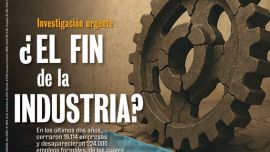The general consensus seems to suggest the Fernández-Fernández administration is on track to sealing a deal with the International Monetary Fund while the opposition, currently led by Buenos Aires City Mayor Horacio Rodríguez Larreta, will clinch a victory in next year’s presidential elections.
This line of thought was already brewing ahead of the PASO primaries that acted as a sort of exhaust valve for the collective Argentine psyche, deflating the “actual” electoral campaign that confirmed the opposition’s victory, despite a commendable comeback in Buenos Aires Province that allowed deputy-elect Victoria Tolosa Paz to ridiculously claim “they lost by winning and we won by losing.” Someone, maybe Catalan political strategist Antoni Gutiérrez-Rubí, the man who professionalised the Frente de Todos’ communications strategy during latter part of the campaign, may have advised Victoria to lower her profile after the elections, as she’d become prime fodder for the digital meme machine.
It’s always important to keep a critical stance, particularly of one’s own assumptions in such a dynamic environment as the socio-political-economic field in Argentina. “You better check yo’ self before you wreck yo’ self,” in the words of legendary hip-hop artist Ice Cube back in 1992. Several of the assumptions that presuppose a steady course of events stand on extremely shaky and uncertain ground, both because of endogenous and exogenous risks.
The market, one of the most imperfect forward indicators, is still trying to figure out how to make money out of all of this, giving a certain level of insight as the collective belief of a group with some sort of skin in the game. The Merval Buenos Aires Stock Exchange index has gone on an incredible rally since early April as it factored in a relative victory for the opposition coalition, Juntos por el Cambio. It flattened out a bit after the PASO primaries, but ultimately peaked coming into the election, capping off a 105 percent rally. Since then, it’s had a substantial slide, but still remains well above its previous values. The Global X MSCI Argentina ETF, a security that tracks the value of Argentine assets, has already erased its electoral gains, dropping back to its values in April, while the market for restructured Argentine bonds remains absolutely depressed hitting eight month lows as paper expiring in 2035 traded as low as 29.3 cents on the dollar.
The first major assumption is that Argentina’s government will reach an agreement with the IMF to restructure its massive debt load, which the sovereign cannot pay. Economy Minister Martín Guzmán was brought in to do this, and he tried to start laying the bricks in the 2021 Budget before being smacked down by Cristina Fernández de Kirchner, who told him it is impossible to win elections while cutting subsidies on utilities. Guzmán, who lost all authority when he was publicly humiliated by Kirchnerite political association La Cámpora by being disallowed to fire a fourth-line official within his portfolio, has kept the charade going with IMF chief Kristalina Georgieva, G20 finance ministers, and his influential academic colleagues.
Now, with the election behind us, time for a deal is running out. Argentina must make an interest payment in December and faces a tough payment calendar in the first quarter of 2022 that it is unable to face. Alberto Fernández did promise he will send a “multi-year” plan to Congress in the first week of December in order to negotiate the IMF deal with the opposition (one of the Fund’s initial requests) and it must include an orthodox plan to slash the deficit that includes cutting energy subsidies and reducing pension payments. It will also require Argentina to seriously reduce its monetary financing of the deficit and lift currency controls, which could cause a shock devaluation. Is the Fernández-Fernández administration willing and able to do that? Is Cristina ready? Both Alberto and Guzmán claim she is.
The second assumed circumstance is Juntos’ return to the Casa Rosada with Rodríguez Larreta taking the top job. The City mayor did win an internal battle against the coalition’s hawks and the Radical Civic Union (UCR) in order to place his main candidates in the two Buenos Aireses (Ciudad and Provincia), and many suggest he “stepped into the ring too early.” Indeed, there are several hotshots looking to take that spot from him, starting with none other than Mauricio Macri and his stooge, Patricia Bullrich. Neurosurgeon Facundo Manes, who ran a fairly successful campaign in the province against Larreta’s candidate (Diego Santilli) has made his pretensions clear, while many suspect Radical Senator Martín Lousteau could be looking for his big break. Even among the centrists, many are already postulating María Eugenia Vidal as the coalition’s candidate for 2023, despite the former governor being Rodríguez Larreta’s ticketleader in the City. Additional pressure from outside, with liberals like Javier Milei and José Luis Espert nibbling at Juntos’ electorate, makes the situation even more complex and unpredictable.
Both of those scenarios seem to suggest an external equilibrium that is far from guaranteed. Covid-19 appears completely under control in Argentina, even in the face of the Delta variant wrecking havoc across Europe while failing to impact South America meaningfully. Yet, Europe is returning to lockdowns and flight restrictions in the face of the Omicron variant and dangerous increases in cases and intensive care hospitalisations, particularly in Germany. A new wave of coronavirus infections, hospitalisations and deaths could be on its way to Latin America, which would disrupt a nascent economic rebound that Argentina badly needs. At the same time, the global financial ecosystem is far from stable. Not only would a new round of Covid restrictions potentially throw global markets into disarray, but a change in cycles is brewing inflation in the US and Europe and several other regions as supply chain disruptions and bottlenecks have added to fluctuations in demand. Expectations of interest rate hikes in the US could also lead to a changing economic cycle which could negatively impact emerging markets.
Political actors in Argentina are stuck talking about the 2023 presidential election, and who will be leading the tickets. But before we get there, they must navigate a world of extreme complexity and fragility. They better check themselves before they wreck themselves.



















Comments